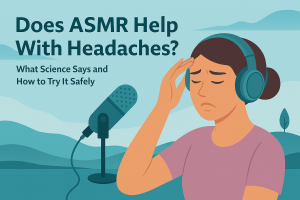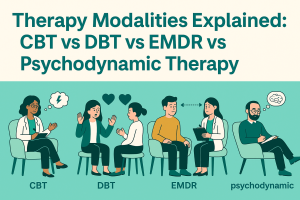People often confuse “emotionally flat” with “dangerous.” In reality, alexithymia vs sociopathy are worlds apart: one is about difficulty identifying and expressing feelings; the other involves manipulation and a disregard for others. This guide clarifies the differences, helps you spot intent vs. confusion, and links to practical tools if you or a loved one need support.
TherapyDial Editorial Team • Clinically reviewed • Updated
Why the difference matters
Labeling someone with alexithymia as a “sociopath” can break trust and worsen avoidance. Ignoring sociopathic patterns can put people at risk. Distinguishing alexithymia vs sociopathy helps therapists choose the right approach, families set realistic expectations, and readers avoid stereotypes.
For clinicians
- Guide documentation with accurate terms (see progress notes, SOAP notes, DAP notes).
- Use correct ICD-10 pairings when relevant (e.g., anxiety or depression co-occurrence: ICD-10 anxiety, depression codes).
- Structure care plans efficiently (see treatment planning guide).
For families & partners
- Spot intent vs. overwhelm; set boundaries accordingly.
- Use practical scripts from our pieces on emotional journaling and alexithymia & relationships.
- Know when trauma is involved (start with PTSD treatment overview and EMDR for trauma).
Our clinical templates help you document intent, impact, and risk properly (without over-writing).
What is alexithymia?
Alexithymia is a trait—not a formal disorder—characterized by difficulty identifying and describing feelings, confusing emotions with bodily sensations, and a tendency to think externally (“What happened?”) rather than internally (“How did it feel?”). People with alexithymia often care deeply but struggle to show it.
“I feel off / tense / weird.”
Flat affect, awkward comfort.
Frequently co-occurs with anxiety or depression—see our quick lookups for anxiety codes and depression codes.
- Emotion labeling via an emotion wheel + daily logs (journaling guide).
- Mindfulness & grounding (see nightmare grounding).
- CBT building blocks (start with cognitive distortions and CBT therapy guide).
What is sociopathy (ASPD)?
“Sociopathy” informally refers to features of Antisocial Personality Disorder: repeated violation of others’ rights, deceit and manipulation, shallow remorse, impulsivity, and irresponsible behavior. Not all people with ASPD are violent, but harm and exploitation are common themes.
Patterns to note
- Charm when useful; contempt when challenged.
- Blame-shifting and gaslighting.
- Remorse is minimal or strategic.
When trauma symptoms drive reactivity (not exploitation), consult our ICD-10 PTSD guide for differential cues.
Boundaries & safety
- Behavioral contracts; written limits.
- Consequences for violation; involve supports.
- Seek trauma-informed care when relevant (e.g., veteran PTSD triggers).
Alexithymia vs Sociopathy: the side-by-side
| Domain | Alexithymia | Sociopathy (ASPD) |
|---|---|---|
| Emotion capacity | Feelings present but unclear; difficulty labeling | Shallow or strategically suppressed; used instrumentally |
| Empathy | Cognitive empathy often intact; affective empathy blunted | High cognitive (to manipulate); low affective (limited care) |
| Intent | Unintentional distance; wants to do better | Calculated advantage; limited remorse |
| Social impact | Awkwardness; missed cues | Exploitation; boundary violations |
| Response to feedback | Guilt/confusion → attempts to learn | Defensive, blame-shifting, or performative regret |
Use our documentation builders to capture intent, impact, and risk (no fluff).
Avoiding misdiagnosis
Flat affect, poor eye contact, or awkward silence can be read as “cold” or “dangerous.” Look for patterns and intent, not one moment. Trauma, insomnia, or anxiety can blunt expression (explore CBT-I sleep reset, ASMR for sleep).
Can someone have both?
True co-occurrence is rare, but a person can present with alexithymia (internal confusion) and separate manipulative traits (external strategy). Differential questions:
- Remorse: Felt internally (alexithymia) vs. performed strategically (sociopathy)?
- Learning: Do skills improve behavior (alexithymia)? Or do limits prompt new tactics (sociopathy)?
- History: Was there trauma driving shutdown? Review anchors like ICD-10 PTSD and veteran resources.
Treatment & support pathways
For alexithymia
- CBT + emotion vocabulary work (distortion drills).
- Somatic mapping, grounding (grounding skills).
- Guided journaling (journal prompts).
- Target comorbidities: anxiety, depression, ADHD.
For sociopathic patterns
- Behavioral contracts; firm limits; consequence clarity.
- Motivational interviewing when buy-in is low.
- Consider specialty care; see differential content (e.g., narcissistic traits overview).
- Track safety; document in concise DAP notes / SOAP notes.
Tackle related triggers step-by-step: misophonia, stress, sleep, and climate anxiety—because the body keeps score.
FAQs: Alexithymia vs Sociopathy
Is alexithymia dangerous or manipulative?
No. Alexithymia reflects difficulty processing emotions, not a desire to harm. If anxiety or trauma are present, start with these primers: anxiety codes guide, PTSD codes.
Can sociopaths feel love or empathy?
They may show cognitive empathy (spotting what you feel) but typically lack affective empathy (feeling with you). Be cautious with boundaries; see our NPD overview for overlapping dynamics.
How do I tell emotional coldness from sociopathy?
Track intent, pattern, and response to harm. Confused people try to learn and repair; exploitative people shift blame and repeat violations. If trauma is active, see flashback management.
Is alexithymia a mental illness like sociopathy?
What therapies help alexithymia?
CBT with emotion vocabulary, somatic awareness, and mindfulness. Try our entries on journaling and distortion work.
What helps partners of someone with alexithymia?
Use clear requests, reflect back somatic cues, and co-create rituals (e.g., weekly check-ins). For conflict-driven insomnia, use CBT-I sleep restriction.
Can ASPD improve with therapy?
Change is difficult and depends on motivation and structure (legal, family, or occupational consequences). Keep boundaries visible; review discharge planning strategies for safe transitions.
Why do people confuse alexithymia and sociopathy?
Similar surface signals: flat affect, awkward comfort, limited eye contact. Under the hood, intent and learning orientation diverge. For intake accuracy, see intake notes.
What if social media worsens emotional numbness?
Try stimulus control + sleep hygiene. These may help: ASMR for insomnia, ASMR for social anxiety, and ASMR for migraines.
How should clinicians code related conditions?
Use precise ICD-10 pairings for comorbidities (e.g., anxiety, depression, OCD), and build a plan with our treatment plan guide.



